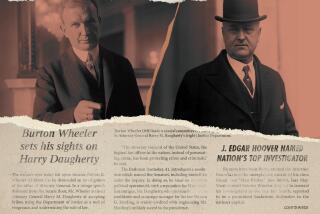Burr and Hamilton: politics’ mean side
- Share via
Early in the History Channel’s nicely done documentary “Duel: Hamilton vs. Burr,” host Richard Dreyfuss gives a modern equivalent for the deadly shootout between the Early American Establishment figures.
“It is as if Dick Cheney and Paul O’Neill came here to shoot at each other,” says Dreyfuss, standing near the spot at Weehawken, N.J., where Burr and Hamilton fought their famous duel over an insult that two centuries later is still obscure.
For the record:
12:00 a.m. Sept. 10, 2004 For The Record
Los Angeles Times Friday September 10, 2004 Home Edition Main News Part A Page 2 National Desk 1 inches; 61 words Type of Material: Correction
Alexander Hamilton -- A review of the documentary “Duel: Hamilton vs. Burr” in the Aug. 27 Calendar section said Alexander Hamilton was unable to become president of the United States because he was foreign-born. That was not an obstacle because the Constitution provided that anyone who was a citizen at the time the Constitution was adopted was eligible for the office.
For cave dwellers without the Internet, Cheney is vice president and O’Neill is the former Treasury secretary who wrote a critical tell-all book about his problems with the Bush administration.
Their long-ago predecessors played a much meaner game of ball, as “Duel” makes clear with dramatic re-creations, slightly bemused narration by Dreyfuss and a good collection of interview clips with historians and writers.
A week after celebrating Independence Day in 1804, Aaron Burr, the vice president, and Alexander Hamilton, “Federalist Papers” author and onetime Treasury secretary, rowed across the Hudson River to settle a matter of honor.
From a distance of 10 paces, Hamilton fired first, hitting a tree. Burr put a slug through Hamilton’s liver and into his spine. Hamilton died 31 hours later; he was 49 and left his family deep in debt. Burr was slapped with murder charges but never taken to trial.
Although a lousy shot, Hamilton, the acid-penned diatribist whose attacks had driven Burr to distraction, is remembered as a major architect of the new nation. Check the image on your $10 bill.
Burr, the patrician and ur-political organizer, is remembered less favorably, even though he would have been willing to cancel the duel if only Hamilton had offered at least a minimal apology for his decade-long jihad. “Burr’s reputation has been stuck at snake-in-the-grass,” says Dreyfuss.
But now an effort is underway to realign the Hamilton-Burr story to give Burr a better break. Hamilton, “Duel” notes, was a Founding Father, but he was also enormously overwrought. Howard Dean has the placid demeanor of a contemplative monk compared to the hot-tempered Hamilton.
Anniversaries can provoke historic reviews, and this July 11 marked the 200th anniversary of the gunplay heard round the world. Plus, Americans are involved in the quadrennial bloodletting called a presidential campaign, so maybe interest in the egos, ethics and underhanded tendencies of big-time politicians is of increasing interest.
A reenactment of the duel last month brought several thousand people to a grassy spot across the wide river, including relatives of the combatants. A new biography of Burr is to be published soon, and the New York Historical Society plans a major exhibit this fall on Hamilton’s life, legacy and shortcomings.
Hamilton -- intense, intellectual, brooding -- could not abide Burr, a dashing party animal who thought politics was a hoot and seemed to have only a light attachment to ideology. Unable to become president because he was foreign-born, Hamilton became the feuder-in-chief.
When John Adams annoyed him, he unleashed a 54-page screed that flayed Adams mercilessly. Compared to a Hamilton hit-job, the modern 30-second television commercials hurled during campaign season are tepid stuff.
“Duel” reminds us that the early American leaders played nasty. Thomas Jefferson disliked Hamilton and Burr and enlisted friendly newspaper editors in his partisan efforts. Hey, you think this stuff started with Fox and Michael Moore?
Just what set Burr off remains lost to history. He had remained aloof from Hamilton’s attacks but, shortly after he lost a race for governor of New York, he challenged Hamilton for some alleged slight.
“Duel” recounts the serio-comic exchange between the two, a ritualized call-and-response that was often used between enemies, with the challenged party expected after a respectable period of time to say the magic mea culpa and avoid bloodshed. Inflated rhetoric was common to the age.
“You have to realize everybody was melodramatic in this period,” journalist Richard Brookhiser says on the show. Hamilton toyed with Burr with coy responses. “Duel” suggests he may have had a suicidal impulse. Two years earlier, one of Hamilton’s sons had been killed in a duel with a man who had offended his father.
After the duel, Burr got involved in some expansionist ventures in the Southwest, was indicted for treason but acquitted and died at age 77 in 1836. “Burr had the bad luck to make two great enemies; one was Alexander Hamilton, the other was Thomas Jefferson, the national saint,” says Gore Vidal, whose novels include “Burr” and who is interviewed for the show.
Two centuries later, maybe Burr’s luck is changing. Or maybe we’ll just have another chance to kick him around again.
*
‘Duel: Hamilton vs. Burr with Richard Dreyfuss’
*
Where: The History Channel
When: 8-9:30 p.m. Sunday
Narrator: Richard Dreyfuss
Producers, Richard Dreyfuss and Lynn Falcon. Director, Lynn Falcon. Writers, Chris Intagliata and Richard Dreyfuss. Interviews with Gore Vidal, Ron Chernow, Richard Brookhiser, Roger Kennedy, Joanne Freeman, Mary-Jo Kline, Arnold Rogow and Carol Berkin.
More to Read
The complete guide to home viewing
Get Screen Gab for everything about the TV shows and streaming movies everyone’s talking about.
You may occasionally receive promotional content from the Los Angeles Times.






